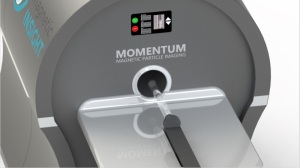by
John W. Mitchell, Senior Correspondent | July 21, 2016
Preliminary results indicate that Magnetic Particle Imaging (MPI) detects magnetic nanoparticle tracers to enable deep tissue imaging of functional events and disease states with exceptional contrast and high sensitivity.
The technology, which is being developed by Magnetic Insight, is generating a great deal of interest — and funding.
“The imminent applications of MPI are in perfusion imaging and cell tracking,” Dr. Patrick Goodwill, Ph.D., chief technology officer at Magnetic Insight told HCB News. “Current approaches to perfusion imaging using CT and MRI frequently return less than ideal image quality.”



Ad Statistics
Times Displayed: 172709
Times Visited: 3121 For those who need to move fast and expand clinical capabilities -- and would love new equipment -- the uCT 550 Advance offers a new fully configured 80-slice CT in up to 2 weeks with routine maintenance and parts and Software Upgrades for Life™ included.
According to Goodwill, MPI is well suited to perfusion imaging and solely detects tracer flow into and out of a patient’s small blood vessels. He said that one application is immune cell tracking. This allows labeling of a patient’s immune cells and to map migration to sites of inflammation caused by such conditions as a solid tumor, arthritis, or an organ being rejected.
He said that MPI is unlike MRI.
“Although they both use magnets, MPI and MRI are not related. MPI is a molecular imaging modality that sees functional events quantified through detecting the precise concentration of an iron oxide tracer anywhere in the patient,” he explained. “Images can be acquired within seconds to minutes as currently applied in animal models.”
MRI, Goodwill explained, produces images showing anatomy, and in which an injectable contrast agent is not always required. In a 2012 paper he and other researchers published in Advanced Materials, they found that MPI “shows extraordinary promise” as a safe substitute for iodinated or gadolinium contrasts. As reported previously in HCB News, gadolinium has come under scrutiny for possible toxic effects and complications in certain patients.
Magnetic Insight is an early diagnostic imaging company accelerating preclinical MPI research with direct translation to clinical applications. The company, which raised $1.4 million in pre-seed funding, announced this week that it had raised an additional $3 million in seed funding, $1 million more than its goal.
“Our current funding round marks the commercial introduction of the preclinical Momentum Imaging System,” said Goodwill.
The latest equity round was led by Sand Hill Angels and other sources, including the Stanford StartX fund. Stanford StartX is a 501(c)(3) startup accelerator funding source. The company’s research conducted over the past decade at UC Berkeley has also been supported through grants from the National Institutes of Health, among others.
“Cell tracking is not well served by current imaging techniques,” said Goodwill.
He added that preclinical testing is already underway in small animals at UC Berkeley. This effort will be expanded in collaboration with the Stanford Medicine neuroradiology department. According to Goodwill, he believes clinical applications could be available within three to four years.

